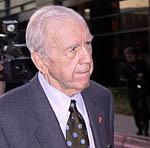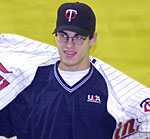By Bob Collins
Minnesota Public Radio
November 7, 2001
Supporters of the Minnesota Twins are scrambling to save the franchise, after baseball owners voted 'overwhelmingly' to eliminate two unspecified franchises. But opponents of public subsidies think it's all part of a ploy to extract more public money for a major league franchise.
| |
|
|
|
||
An effort to force baseball to continue the Twins franchise by threatening Congressional action to remove baseball's cherished anti-trust exemption seemed to get a lukewarm response in Washington.
Both Gov. Jesse Ventura and Mayor Norm Coleman, a Republican candidate for Senate, have urged Congress to rescind the exemption. But Sen. Mark Dayton, D-Minn., says members of Congress have neither the time nor the interest to deal with the issue.
But Dayton's colleague, Sen. Paul Wellstone,said in a written statement, "the anti-trust exemption has given the owners immunity from challenge, and I do not believe they should be immune."
Rep. Betty McCollum, D-Minn., says the vote for contraction shows baseball may be overstepping its bounds. The first-term Democrat says Baseball Commissioner Bud Selig suggested as much when he announced the league's decision. "He called baseball a big business and said 'We're doing what any big business would do.' Well, if you're a big business, you're going to be treated like a big business," McCallum said.
| |
|
|
|
||
Twins utility infielder Denny Hocking, the team's union representative, says he'll meet with union officials on Thursday to try to sort out the team's future, but he suggested that an offseason of court hearings on the issue is all but assured. He said the filing of a court challenge would likely prevent contraction from occuring before 2003.
But Hocking said a publicly financed stadium would be needed to save the team. "You've got a team that's on the cusp of going to the playoffs, but if you don't get a new stadium, you're going to prevent that from happening," he said.
Hindering efforts in that direction is the fact that nobody is emerging to lead the drive. Timberwolves owner Glen Taylor - among the state's richest people, and a former suitor who sought to purchase the Twins - said he'd be willing to help an effort to keep the team alive, but said he wouldn't take a lead.
But sentiment against a publicly financed stadium for the Twins appeared unchanged Tuesday despite the vote.
| |
|
|
|
||
"The only thing they seem to care about is the money," State Sen. John Marty said. "It' like, the heck with the sport. They are not even trying to put up a pretense of loving baseball."
House Majority Leader Tim Pawlenty didn't think a renewed threat of the Twins' demise will change the Legislature's unwillingness to pour significant tax dollars into a stadium effort.
"I think legislators have factored in the threat of contraction into their thinking," he said. "I don't think that the threat of contraction at our doorstep is going to fundamentally change the dynamics." Few Twins players seem worried that contraction will eliminate their jobs. "The players are going to have employment one way or the other," Hocking told Minnesota Public Radio. He said he is more concerned about minor league players and people who work in the front offices of the Twins and its minor league affiliates.
And some of the players in the Twins' farm system are also wondering their own futures. St. Paul native Joe Mauer, picked first overall in this summer's baseball draft by the Twins, may be reconsidering his future in the sport now that the Twins might be eliminated in Major League Baseball's contraction plan.
Mauer, The Associated Press' prep football player of the year for Minnesota last season, was recruited to play quarterback by Florida State. But he said he doesn't look forward to negotiating with another team if the Twins fold and he has to find another employer.
"This is what I've always wanted to do," said Mauer, who batted .400 over the summer for the Twins' rookie-league team in Elizabethton, Tenn. "But there would be a better chance. I'm not saying totally no."
Florida State coach Bobby Bowden, who recruited Mauer out of Cretin-Derham Hall High School, said Wednesday he wrote Mauer earlier this year to let him know he'd always be welcome with the Seminoles if he had a change of heart.
"It would be very interesting if he did," said Bowden, who welcomed back a 24-year-old Chris Weinke in 1996 after Weinke spent six years in baseball's minor leagues.
The threat to eliminate the Twins is reverberating far beyond the upper Midwest. The Twins train in Fort Myers, on the southern Gulf coast and officials there are wondering the future of their own "franchise."
"The month of March in Florida is a big time for people coming in for spring training, so losing these teams is not something we'd like to see," said Nick Gandy, a Florida Sports Foundation spokesman.
A city that has a Grapefruit League team taken away would be struck with a significant financial blow. A study commissioned by the foundation found that spring training brought an economic impact of $490 million in 2000. Also, more than 5,500 full-time jobs are supported and attendance at the state's 19 ballparks was nearly 1.6 million.
The Twins pay Lee County $300,000 in rent annually with its lease expiring in 2010, county Director of Economic Development Janet Watermeier said. The lease agreement between the county and the Twins states that if the team breaks the lease, "the club shall be liable to reimburse the county all regularly scheduled payments of principal and interest due on the bonds ..." "(The Twins) would still be obligated to pay rent until there was another team in there," Watermeier said.
A hearing in Minnesota on a temporary restraining order barring the collapse of the Twins' franchise is scheduled for Thursday. The Metropolitan Sports Facilities Commission, which owns the Metrodome, asked for the order to keep the Twins from breaking their lease at the facility.
(Minnesota Public Radio reporters Michael Khoo and Tom Scheck, and the Associated Press contributed to this report)
More Information

